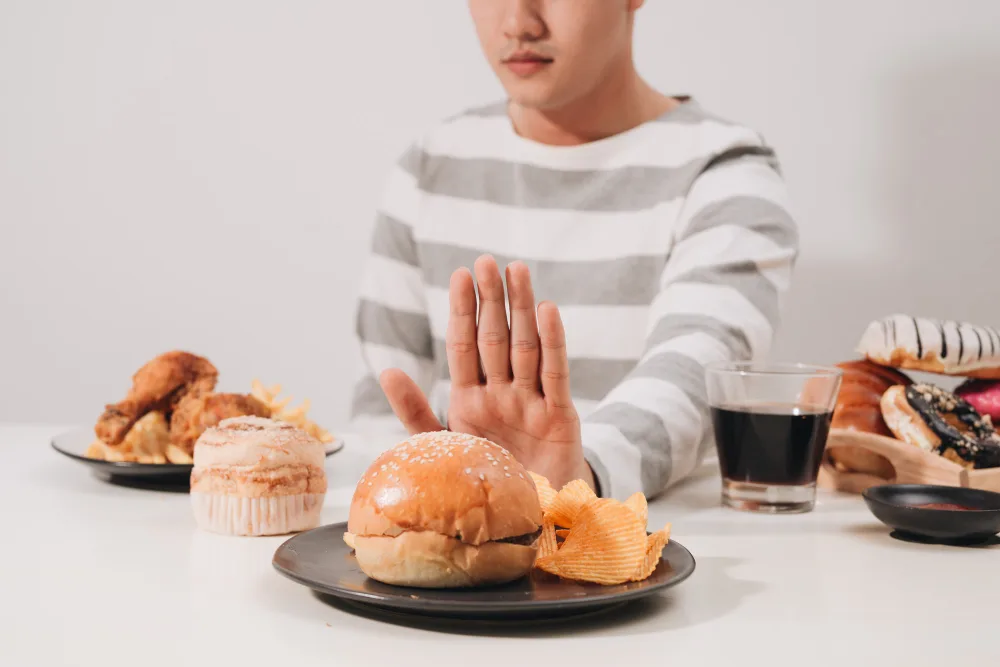7 Foods to Avoid with COPD
Living with Chronic Obstructive Pulmonary Disease (COPD) can be challenging. Managing symptoms like breathlessness, fatigue, and frequent lung infections often requires a combination of medical treatment, lifestyle changes, and, most importantly, a healthy diet. Your food choices directly impact lung function, energy levels, and overall quality of life. That’s why it’s essential to know the foods to avoid with Copd so you can breathe easier and feel healthier. In this blog, we’ll explore the 7 foods to avoid with Copd, why they are harmful, and what alternatives you can choose.

1. Fried and Greasy Foods
Fried foods such as pakoras, samosas, French fries, and burgers are loaded with unhealthy fats that can negatively impact health, especially for individuals with respiratory conditions like COPD. These foods can increase bloating and indigestion, putting added pressure on the diaphragm and making breathing more difficult. Additionally, they contribute to weight gain, which further impairs respiratory function, and can cause inflammation that worsens COPD symptoms. A healthier alternative is to opt for grilled, baked, or air-fried snacks, which are lighter, easier to digest, and less likely to aggravate respiratory issues.
2. Processed Meats
Sausages, bacon, hot dogs, and ham are among the worst foods to consume for individuals with COPD, primarily because they contain preservatives known as nitrates. These nitrates can trigger inflammation in the lungs, reduce the body’s ability to transport oxygen efficiently, and increase the risk of lung infections. To support better lung health and avoid these negative effects, it’s advisable to choose fresh, lean sources of protein such as chicken, fish, eggs, lentils, or paneer, which provide essential nutrients without harmful additives.
3. Excess Salt and Salty Snacks
Chips, pickles, instant noodles, and packaged soups are high in sodium, which can be particularly harmful for individuals with COPD. Excess salt intake leads to water retention, causing swelling in the ankles and legs, and can raise blood pressure, placing additional strain on the heart and lungs. This can lead to worsening breathlessness and increased discomfort for patients with COPD. A healthier approach is to enhance the flavour of food using herbs and spices such as black pepper, garlic, or lemon juice instead of relying on excessive salt.
4. Sugary Foods and Drinks
Excess sugar from sweets, chocolates, pastries, and soft drinks is another category of foods that should be avoided by individuals with COPD. A high intake of sugar can weaken the immune system, making the body more vulnerable to infections. It also contributes to weight gain, which puts additional strain on the lungs and makes breathing more difficult. Moreover, sugary foods can cause spikes and crashes in energy levels, leading to fatigue. To satisfy sweet cravings in a healthier way, it’s better to opt for natural alternatives like fruits, dates, or jaggery in moderation.
5. Carbonated Beverages
Sodas, sparkling water, and energy drinks release carbon dioxide gas, which can lead to bloating and discomfort by restricting the movement of the diaphragm. This can result in increased shortness of breath and place additional stress on lung function, making these beverages particularly problematic for individuals with COPD. For better hydration and respiratory health, it’s advisable to stick to plain water, herbal teas, or fresh coconut water, which are gentler on the system and support overall well-being.
6. Alcohol
Alcohol is another major food and drink to avoid for individuals with COPD, as it can have several harmful effects on respiratory health. It dehydrates the body, which thickens mucus and makes it more difficult to clear from the lungs. Alcohol can also interfere with the effectiveness of COPD medications and reduce immune defense, increasing the risk of infections. If you choose to drink, it’s important to keep it minimal. A better option is to switch to non-alcoholic beverages such as fruit juices or buttermilk, which help keep the body hydrated and support overall health.
7. Full Fat Dairy Products
Milk, cheese, butter, and cream are often considered nutritious, but for individuals with COPD, full-fat dairy products may not be the best choice. These foods can increase mucus production, making it harder to breathe, and may also cause bloating and a feeling of heaviness. Additionally, they add unnecessary saturated fats to the diet, which can negatively impact overall health. A better option is to choose low-fat milk and yoghurt, or plant-based alternatives such as almond or soy milk, which are easier to digest and less likely to worsen respiratory symptoms.
Conclusion
Living with COPD requires careful attention to lifestyle, especially food habits. By avoiding fried foods, processed meats, excess salt, sugary items, carbonated drinks, alcohol, and full-fat dairy, you can significantly improve your breathing and overall health.
Remember, every small step counts. Managing COPD isn’t just about medicines but also about smart dietary choices.
If you or your loved ones are struggling with COPD and need expert guidance, consulting a specialist can make all the difference. Dr. Hrushikesh Vaidya has years of experience in treating lung diseases and helping patients manage COPD effectively.
Related Posts

Asthma and Allergies: How They Are Connected and How to Manage Both
- vaidya doctor
- April 14, 2025
Asthma and Allergies: How They Are Connected and How to Manage Both Asthma and allergies are tw ..

Lung Fibrosis Treatment in Thane by Dr. Hrushikesh Vaidya: Managing Symptoms and Approaches
- vaidya doctor
- May 20, 2025
Lung Fibrosis Treatment in Thane by Dr. Hrushikesh Vaidya: Managing Symptoms and Approaches Nav ..




